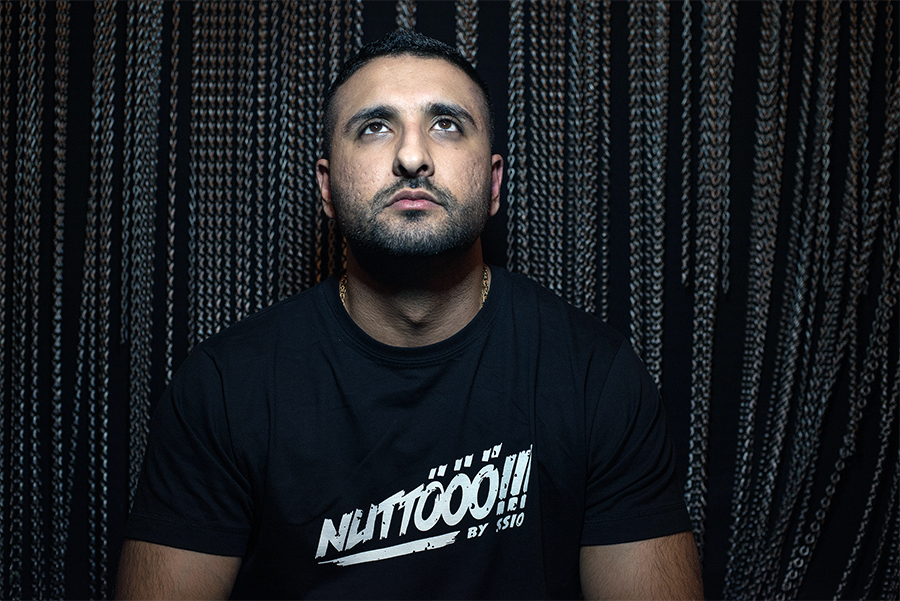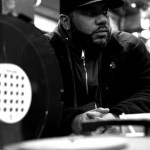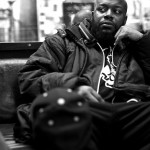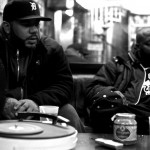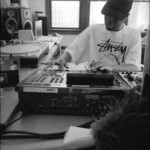"The hardest thing to do is something that is close…
Im Rahmen ihrer Europatour machten Apollo Brown und Guilty Simpson auch in Wien Halt. The Message war vor Ort und sprach mit ihnen über ihre Kollabo-Platte „Dice Game“, die wirtschaftliche Situation in Detroit und die Gründe für Browns zeitweiligen Ausstieg aus dem Game. Bei der anschließenden Show überraschte ein trotz, der wie sie immer wieder betonten „18th of 18th show of our tour“, äußerst vitales Duo die zahlreich gekommenen Besucher. Guilty ließ sich sogar zu mehreren Freestyles inklusive dem obligaten “J Dilla rest in peace“ Schluss-A-capella hinreißen. Alles in allem ein solider Auftritt, auch wenn man sich von Apollo Brown vielleicht etwas mehr Engagement hinter seinem Laptop erwartet hätte.Mit einem alten Philips Plattenspieler und einem Gil Scott Heron Track im Gepäck, der auf 7Inch White Label erschienen ist, überraschten wir Apollo Brown. Immerhin hat dieser einen RIP Track für Dilla produziert, der diesen Song auf „Skilled Trade“ samplet.
During Apollo Brown’s and Guilty Simpson’s Europe tour, they also played a gig in Vienna. The Message talked with them about their collabo-album “Dice Game”, the environmental situation in Detroit and the reasons for Brown’s temporary break of the producing game. At the following show they surprised a large audience with a strong performance despite it was the last show of the tour. Guilty even did several freestyles including the obligate “J Dilla rest in peace” acappella in the end. All in all it had been a solid show, even though you could have expected Brown to be more active behind his laptop.
We also came up with an old Philips turntable and a 7inch white press Gil Scott Heron Track which he sampled on a RIP track for Dilla on “Skilled Trade.”
TM: What‘s the story behind „Dice Game“?
Apollo Brown: We both represent Detroit, we both live there. We know each other for 4 or 5 years, see each other all around the city so it was kind of a natural thing for us to do that. One day we got together and we were like let’s do an album. That was 3 years ago. But we are both busy. So there was a rumour generated, because we announced it every now and then as a joke and people would eat it. Finally we decided to sit down and get this done, and there you go, that’s “Dice Game”.
One of the stand-out songs on the album is „Reputation“, in which you rap about your hometown Detroit and talk about the problems the town has to fight. What do you think about the situation of your hometown?
Guilty Simpson: People are simply surviving. It’s not the best situation like in other American major cities; because of the lack of money people tend to always have side hustles or something.
However that builds character in the people. Bad situations require greatness sometimes to get out of it. That’s what we do with music, athletics and many other different things. „Reputation“ is a sort of a salute to anybody representing my city.
People always have an idea of Detroit being a certain kind of city.Since we both live in Detroit, we have a different view and aspect of the city that we want to spread. In my opinion it was worse a couple years ago now it’s on the way back up slowly, nevertheless it won’t happen in one year, it will take time to process.
Did Obamas strategies help?
I would say it has something to do with Obama, because he decided to bail out the three big car companies. He took government money and helped them get back on their feet.
That affected Detroit directly, because that is where the companies work, that allowed them not to worry about the money they lost and they paid the it back, what a lot people don’t understand. As a result they still profit and that allows them to hire people in the city again.
What role do projects like for example Ma dukes “Dillatroit” play in supporting Detroit’s music scene?
Guilty Simpson: It brought a lot of people together that would never have got the chance to work with J. Dilla, but it was an attempt to unify the city and a lot of people were able to get songs on the same project.I definitely think that the intensions to get the city going again were good.
In in my opinion it didn’t have anybody that should have been involved included, but some good came out at the second “Dilla day” in Detroit and the show was a success. Sometimes you might not agree with all the methods, but as long as it turns right it is fine.
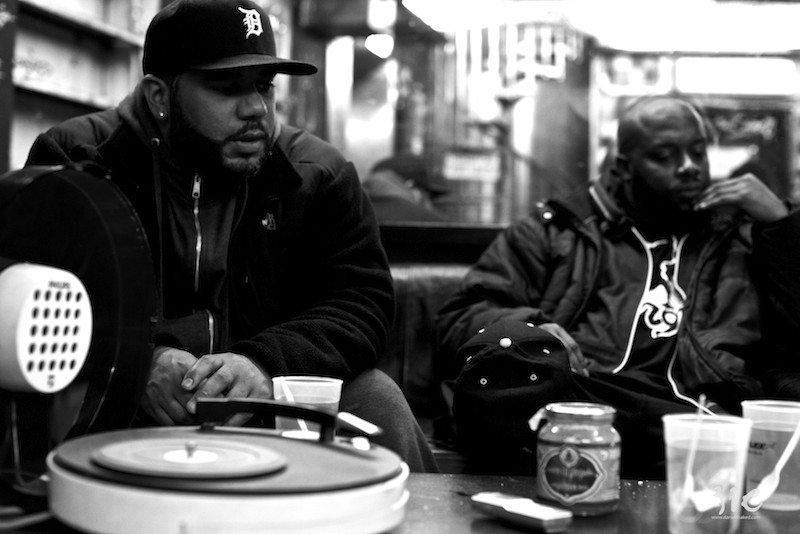
Do you think after J Dilla passed away it got easier for Detroit producers to establish themselves, because they didn’t have to stand in Dillas shadow anymore?
Apollo Brown: Ahm..that is a weird question. I mean we are all own people, we as producers are our own and I am hoping that everybody tries to make their own style and type of music and is not imitating Dilla or Premo or anybody else. But I mean I don’t think a person getting big, or passing away, or retiring really has any impact on someone else’s success. I don’t think that this has any impact on another person’s success in the way they make music and the way they are being successful in the game. So that’s a hard question to answer.
Guilty Simpson: I don’t think it had any impact on the other producers that he has passed away. Let’s be honest Dilla didn’t get the recognition he deserved until he passed. He was not the most recognized producer in the game even before he passed, so I don’t really think it has anything to do with the talented guys from my city. They have been doing well before he passed away, and so are they now. For example J Dilla introduced me to Black Milk and said that I needed to work with him. He was on his way before, already acknowledged by Dilla, but it is a typical Detroit thing, with the exception of a couple of artists you’re always the underdog you always have to work twice as hard to get recognised.
You quit producing for a while, you made a break for several years, and then returned with „Skilled Trade“ (2007). What was the main reason for your comeback?
Apollo Brown: I quit between 2005 and 2007 because I didn’t wanna make beats anymore. And the reason for that: I was caught up in listening to the radio and watching TV. I felt like I’ve lost the fan base for my type of music, I was just done and started to do other things. Actually my cousin and an ex -girlfriend found out what I did, they heard some stuff and got some fire under me again. Then I needed to know if I even rememberd how to make a beat. I made one right away, it was like jumping on a bike. My cousin was showing me that there were a lot of people still listening to real hip hop, the boom bap sound, so I decided to get back into it again.
In your music you talked about Detroit as a run-down city and also about the hype with a lot of young artist coming to Detroit because of the empty buildings and the cheap rents. As Mcees and spokesmen of your city, do you feel that Detroit got some hype now?
Guilty Simpson: Although we have a driving economy with many people leaving the city it’s still a big city with a lot of history. Even before Dilla passed and the recession hit the city, people were interested. But now as Detroit is back on the rise, it seems to be the best time to buy properties and live in Detroit again. A lot of people from the suburbs move to downtown so it is more diverse than it has ever been before. Every time a city gets hit by a recession properties are getting cheaper, so a lot of people want to be part of the rebuilding process now.
It is good for the city that people know that everybody can come to the city to be creative because the city is oozing with creativity at the moment.
You released that you will produce the cassette version of Ghostface Killah’s new album, what can we except from it?
Apollo Brown: Adrian Young produced the CD version of the album and I was asked to produce the cassette version. It‘s a theme album with a story line that goes about 12 songs, everything comes with a comic book and some other extra-gimmicks.
The sound is a lot different than most people would except from me, a little gutter, a little grimier, the drums are not that hard and they sink down into the tracks a little more. There are even some fast songs on the album.
Some people will love it and some will hate it cause it is not the typical Apollo brown sound, but I am glad to have done the project, because it was a big challenge and it turned out to be dope project.
Interview by Felix Diewald & Thomas Kiebl
Photography: Daniel Shaked | www.danielshaked.com ©2013
Ähnliche Posts
- "Srebrenica is the fault of the UN" // Edo Maajka Interview
There is something going on in South-Eastern Europe and who can tell us better about…
- Ghostface Killah - Rise of the Black Suits (Video)
Ghostface Killah mit einem Video zur Cassette-Version von "Rise of the Black Suits", welche von…
- The Story of a Long Lost Relative // DJ Werd Interview
DJ Werd ist seit Jahren eine Art "graue Eminenz" im deutschen HipHop-Geschehen. Aufgewachsen in San Jose,…





